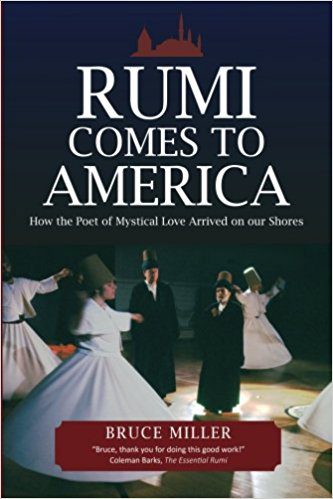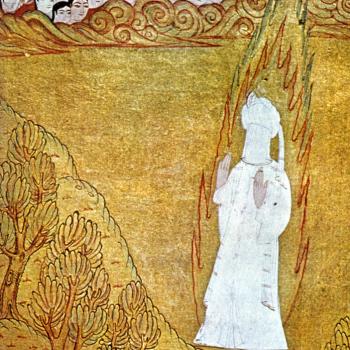
Author: Bruce Miller
Publisher: Miller eMedia
What happens when a mercurial Englishman living in 1970’s California invites into his community of spiritual seekers a Turkish Muslim mystic? The answer can be found in this book. The Turkish mystic was one Suleyman Hayati Loras Dede, and the mercurial Englishman one Reshad Feild. The author, Bruce Miller, was an integral part of Feild’s community and the book begins with a brisk sketch of what they were up to before Dede’s arrival. We get the sense of a sincere group of seekers engaged in an intense, yet perhaps incoherent and exhausting round of spiritual exercises derived from many different traditions, the Gurdjieff work being a major influence. Feild’s decision to invite Dede seems to have sprung from an inspired humility, for in making room for another spiritual teacher he allowed his community to come into contact with a living, coherent teaching: the Mevlevi Path of Jalaluddin Rumi which Dede represented.
Suleyman Dede, a diminutive, seventy-three-year-old man in a dapper three-piece suit, by all accounts simply radiated love. The centre-piece of the book is the words of the man himself, recorded one evening as he spoke through a translator to a crowded room of Feild’s followers in 1976, faithfully retranslated from the Turkish for the benefit of this book. The description of that evening, along with the compelling reminiscences of his student and secretary, David Bellack, which are sewn throughout the book, constitute the beating heart of what is offered here. This is meant as no disrespect to the author; his ability to allow other voices to the fore is one of the most appealing aspects of this book.
From the transcript of that evening we understand why it is that the dervish is described as “the child of the moment”. We sense a child-like joy and gratitude, as well as a complete mastery of the moment, as we read the words of Suleyman Dede. Knowing exactly what is appropriate to his audience despite the language and culture barrier, his courtesy and humility weaves quite a spell. As he responds to questions he covers a number of issues, from Islam’s attitude towards other religions and how it might find expression in the West, to revelations concerning Ataturk’s real attitude towards the Sufis in Turkey (many readers will be surprised by Dede’s take on this). All this is fascinating, but the greatest lesson may not be in what Dede says, but the graceful and generous way in which he holds the room and responds to people. For example, at one point he reflects back the sincerity of heart he perceives in his audience and gives them a glimpse of how important their own inner state is in the alchemical process they are experiencing: “If we had a single discourteous, nadan, person among us, I would not be able to speak further. Nobody would be able to speak. How am I able to speak? I more or less guess and feel what you want me to say. This makes me happy. I thank God that we can be together and enjoy good conversation.”
As Dede’s spiritual discourse unfolds, the author allows retrospective commentary from Bellack to now and then provide context and deeper understanding. Later chapters in the book give even more room to Bellack, and a moving picture emerges of their student-teacher relationship throughout the seventies into the early eighties. Bellack informs us: “There are few people who truly recognize Dede’s station. We know him as a sheikh, but he was also a murshid, about which he spoke to me on one occasion in private in late 1975. I offer this not out of any misplaced loyalty, but from objective knowledge of the heart that Suleyman Hayati Dede was a true servant of Hazrati Mevlana. He was an embodiment of both the Masnavi and Rumi’s teachings.”
Ibrahim Gamard acts as something of a counter-weight to David Bellack in the book. After having first encountered the Mevlevi Order through Suleyman Dede, Gamard seems to have eventually aligned himself with the more conservative side of the order. He is now himself a Mevlevi shaikh and the author tells us that Gamard has come to believe that the official representatives of the Mevlevi order in Turkey, the Celebis (the descendants of Rumi), never considered Dede as anything more than a humble cook and dervish, certainly not a shaikh with the authority to initiate others and bring Rumi to the West. Yet according to the author, Gamard also acknowledges that he himself was deeply moved by his encounters with Dede, and harbours an ambivalence which he has never been able to resolve.
A revealing picture – unfortunately not included in this book – is drawn by Kabir and Camille Helminski who were close to Suleyman Dede during the last five years of his life, visiting him annually and corresponding regularly. They also knew Celalettin Celebi, the head of the Mevlevi order, who initiated Kabir officially as a shaikh in 1990 (the first Westerner to receive this honour). Kabir says that Suleyman Loras led public sema ceremonies and was deeply respected not only by Mevlevis but by Bektashis, Jerrahis, and others. In fact, Suleyman Dede had an ijazah (official “diploma” of shaikhhood) from four tariqahs as well as the Mevlevi.
As much as this book is concerned with Suleyman Dede, it is also an affectionate yet clear-sighted portrait of Reshad Feild, the man who invited him to the USA. Miller does not whitewash Feild’s theatrics, and provides a number of humorous anecdotes to illustrate it. Yet at the same time he helps us appreciate Feild’s brilliance, sincerity, and creative energy. In reflecting on why he remained loyal to his teacher, Miller leaves us with the impression that Feild’s human failings only increased his affection for the man.
We are not really given a clear sense of how the path of Rumi unfolded for Reshad Feild, David Bellack, and Ibrahim Gamard following their time with Dede. The author briefly describes an uninspiring encounter he had with Dede’s son, Jelaleddin Loras, who eventually settled in Hawaii and set up the Mevlevi Order of America. But we get no sense of how effective this organisation may have been in continuing the work of his father. It would have been interesting to know how each of these students of Dede nurtured the seed they were given, and an important question remains unanswered: Has the seed blossomed into a genuine path of spiritual transformation here in the West? But who would be qualified to objectively answer this?
Miller does briefly describe his own life-long efforts to make Rumi accessible to Western audiences, and though the electronica dance-beats to which he whirls may not appeal to everyone, one cannot deny his devotion. The final chapters of the book are essentially a defence of the popularist approach to Rumi. Miller aligns himself with Coleman Barks, and notes the synchronicity that led Barks to begin working on his versions of Rumi around about the same time that Dede was bringing Rumi to the USA. He does a good job of making a case for the worth of Barks’ freewheeling translations, whilst also giving some space to opposing attitudes (again provided by Ibrahim Gamard, himself a more literal translator of Rumi’s poems).
But the major shortcoming of the book is that due to its tight focus on the circle of Reshad Feild, it omits the story and input of others connected to Dede’s mission in the West. Its attempts to assess Dede’s legacy are therefore very partial. For instance, Murat Yagan appears fleetingly in the book – to offer a gentle rebuke to Reshad Feild – but we get no sense of who this man was or what part he had to play in this tale. Yet Dede had the highest opinion of this teacher of the Kebzeh Caucasus tradition (who settled in Canada in the sixties), and much more might have been said about him.
Then there is the absence from the book of Kabir and Camille Helminski. Perhaps more than anybody else in the West, they have inherited the spirit of Suleyman Dede and his open-hearted approach to the Mevlevi Path. Their story would surely have given us a fuller picture of Dede’s influence. Sadly, as it is, the book gives the impression that most of Dede’s hopes rested on Reshad Feild and his immediate circle, and thus bore only limited fruit. In truth, what flowered from the seeds Dede planted is more beautiful than this book can convey.
Despite these significant omissions, this is an illuminating book for those interested in how Sufism has evolved in the West. Dede was at pains to tell the author that there is really only one actor in this drama. Nothing is our doing; the answer is always “God did it.” If this is so, Rumi Comes to America describes something wonderful that God did through Suleyman Dede some forty years ago. It confirms at the same time that this humble man was indeed “a true servant” of Rumi.












